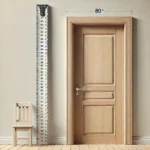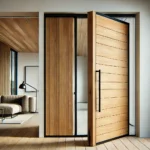Commercial doors play a crucial role in the functionality, security, and aesthetic appeal of commercial buildings. These doors are not merely entry and exit points; they are essential components of a building’s infrastructure, designed to meet specific needs depending on the type of business and its operational requirements. From offices and retail outlets to warehouses and industrial facilities, commercial doors are tailored to enhance safety, efficiency, and overall design.
What Are Commercial Doors?
Commercial doors are specially designed doors used in non-residential buildings. Unlike residential doors, they are built to withstand heavy use, adhere to building codes, and often meet fire, safety, and accessibility standards. These doors are available in various materials, sizes, and designs, making them suitable for a range of commercial applications.
The materials commonly used for commercial doors include steel, aluminum, wood, and glass. Steel doors are popular for their durability and security, often used in warehouses, manufacturing facilities, and storage areas. Aluminum and glass doors are commonly seen in offices, retail stores, and showrooms, offering a sleek, modern look while allowing visibility and natural light. Wooden commercial doors are often chosen for their aesthetic appeal, especially in offices or hospitality settings.
Importance of Commercial Doors
The importance of commercial doors extends beyond their basic functionality. They contribute significantly to a building’s overall security, energy efficiency, and accessibility. For businesses, these factors are not only critical for daily operations but also for meeting legal and safety requirements.
Security is one of the primary concerns for any business, and commercial doors provide the first line of defense. Reinforced materials, secure locking mechanisms, and additional features like electronic access control ensure that the premises are protected against unauthorized entry. In industries dealing with sensitive data or valuable assets, advanced security doors with features like biometric locks or CCTV integration are often used.
Energy efficiency is another critical aspect. Many commercial doors are designed to minimize energy loss by providing proper insulation and sealing. This is particularly important for businesses in climates with extreme weather or industries that rely on temperature-controlled environments, such as food storage or pharmaceuticals.
Accessibility is also a significant consideration for commercial doors. Compliance with the Americans with Disabilities Act (ADA) or similar regulations in other countries often requires businesses to install doors that are easy to open and wide enough for wheelchair access. Automatic doors, for instance, are a popular choice for ensuring accessibility while enhancing convenience.
Types of Commercial Doors
The variety of commercial doors available ensures that businesses can choose the best option based on their specific needs. Common types of commercial doors include steel doors, fire-rated doors, glass doors, roll-up doors, and sliding doors.
Steel doors are known for their durability and strength, often used in facilities where security is paramount. Fire-rated doors are specially constructed to withstand fire for a certain period, providing essential protection in emergencies. Glass doors, often framed with aluminum, are widely used in offices and retail environments for their modern look and ability to let in natural light.
Roll-up doors, also known as overhead doors, are frequently used in warehouses and storage facilities. They are space-saving and can be designed for heavy-duty use. Sliding doors are popular in retail stores and hospitals, offering both functionality and aesthetics. Each type of commercial door serves a unique purpose, ensuring businesses can operate smoothly and securely.
Choosing the Right Commercial Door
Selecting the right commercial door involves evaluating various factors such as the purpose of the door, the level of security required, aesthetic preferences, and budget constraints. For instance, a retail store may prioritize doors that enhance visibility and appeal to customers, while a manufacturing facility might focus on durability and security.
Businesses must also consider the door’s compliance with safety regulations and standards. Fire-rated doors, for example, may be mandatory in certain settings to ensure safety during emergencies. Additionally, energy efficiency and noise reduction can be critical for offices and facilities that aim to create a comfortable environment for employees and visitors.
Another important aspect is the maintenance and durability of the door. Commercial doors are subject to heavy usage and need to be reliable over time. Opting for doors made from high-quality materials and installed by professionals can prevent frequent repairs and replacements.
Innovations in Commercial Door Technology
The commercial door industry has seen significant advancements in technology, enhancing functionality and security. Smart doors equipped with sensors, automated locking systems, and integrated access control are increasingly popular. These doors not only improve security but also provide convenience by allowing remote operation and monitoring.
Fire-rated doors with advanced materials and designs are now capable of providing better protection while maintaining an aesthetically pleasing look. Energy-efficient doors with enhanced insulation properties help businesses reduce their carbon footprint and lower energy costs.
Additionally, antimicrobial coatings on commercial doors are becoming a standard in healthcare facilities, ensuring hygiene and safety in environments where cleanliness is critical.
Installation and Maintenance of Commercial Doors
Proper installation and maintenance are crucial for maximizing the functionality and lifespan of commercial doors. Hiring experienced professionals ensures that the doors are installed correctly and comply with all relevant codes and standards. Regular maintenance checks can identify potential issues such as wear and tear, misalignment, or problems with locking mechanisms.
For high-traffic areas, it’s essential to schedule periodic inspections to ensure the doors operate smoothly and remain safe for daily use. Businesses should also train employees on the proper use of doors, especially those with advanced features or automated systems.
The Role of Commercial Doors in Branding
Beyond functionality, commercial doors also play a role in branding. The design, material, and overall appearance of a door can contribute to the first impression customers or clients have of a business. Sleek glass doors with custom logos can create an inviting and professional atmosphere for offices or retail spaces. On the other hand, robust and secure doors may signal reliability and safety for industries like banking or logistics.
Customized commercial doors allow businesses to align their functional needs with their brand identity, creating a cohesive and professional image that resonates with clients and customers alike.
Conclusion
Commercial doors are an integral part of any business’s infrastructure, offering a blend of functionality, security, and design. From ensuring safety and compliance to enhancing aesthetics and efficiency, these doors serve multiple purposes that are essential for smooth operations.
By understanding the types, importance, and innovations in commercial doors, businesses can make informed decisions that align with their specific needs. Platforms that offer a wide range of options and professional services ensure that companies find the right fit for their requirements. Investing in high-quality commercial doors is not just about meeting immediate needs; it is about securing the future of your business with reliable, efficient, and visually appealing solutions.
![]()





